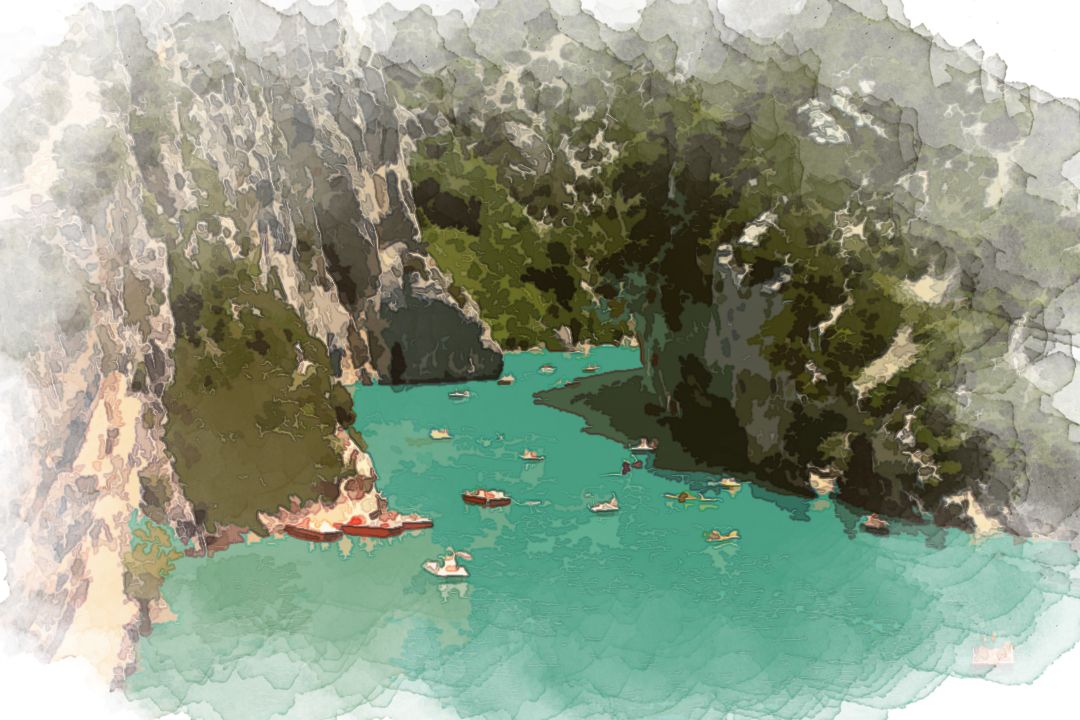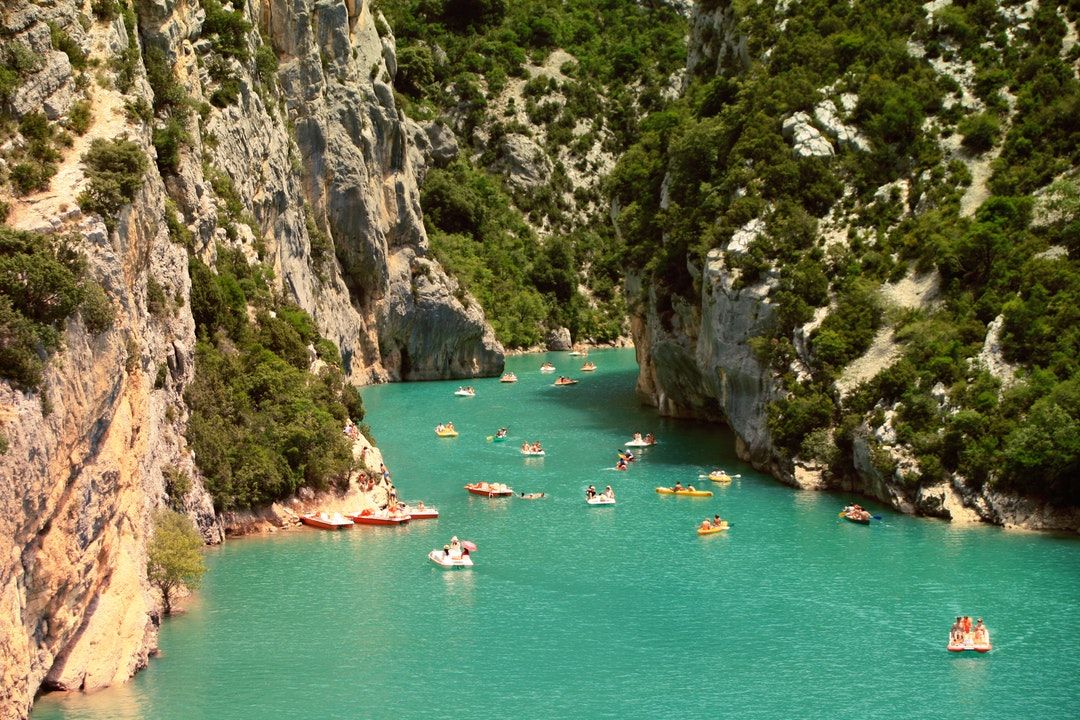Mother Nature is the Host With the Most

Whatever Floats Your Boat
Sophia’s laughter was a melody that harmonized with the gentle lapping of the water against the hull of her boat. The gorge was her escape, a canvas of nature where the problems of the world were repainted into scenes of tranquil beauty. With every stroke of her paddle, the ripples seemed to playfully chase one another, only to dissolve into the turquoise expanse of the water.
Her boat was a quaint vessel, its sides brushed with strokes of paint that told of countless journeys under the sun. She had named it ‘The Möbius’, a tribute to the endless paths it had carved upon the waters, each trip a loop in an infinite sequence. Onboard, her companions were an eclectic mix of friends who sought the same reprieve from their cyclic toils.
So we beat on, boats against the current, borne back ceaselessly into the past.
— F. Scott Fitzgerald (1896-1940)
These words from F. Scott Fitzgerald resonated with Sophia as she gazed at the others in their boats. Each stroke forward was a challenge to the relentless current, a testament to the human spirit’s stubborn push for progress, only to be drawn back into the echoes of yesteryear with every glance backward. But here, in the gorge, the past was not a shackle but a buoyant force, lifting the spirits with each memory relived in laughter and tales.
Alexander, in the boat beside her, wore a captain’s hat askew on his head, a comical figure of authority on a vessel powered by mirth. “Admiral Sophia,” he called, “do we sail to new memories or drift towards the old?” His question, wrapped in jest, held a truth they all grappled with.
Sophia’s reply came with a smile, “We navigate the Möbius, dear Alexander, where past and present are but the same waters viewed from different points of the loop.” The group erupted into chuckles, their shared understanding a private joke against the tyranny of time.
The day wore on with the sun casting long shadows over the water, painting the cliffs in hues of gold and amber. The laughter of the boaters was the soundtrack to this moving picture, their joy the color that brought vibrancy to the ancient rocks.
As Sophia looked at the faces around her, each lit by the gentle glow of the afternoon, she realized that their joviality was a rebellion against the somber march of the seconds. Here, in their floating parade, they found a way to slow the relentless march, to savor the present even as it slipped into the past.
They stopped their boats in a quiet cove, the cliffs rising around them like the walls of a cathedral dedicated to the reverence of nature. Here, they shared food and drink, their boats tethered together like a raft meant for a journey of camaraderie rather than conquest.
The current that had fought them now cradled them in a gentle embrace, a reminder that in the grander scheme, it was not the destination but the journey that mattered. They floated there, in the heart of the gorge, as the water carried them slowly, imperceptibly, back the way they had come.
The past was a current, but it was also the wind in their sails, the stories that propelled them forward even as they looked back. And as the light began to wane, Sophia felt a contentment settle within her, a peace that came from understanding that the cycle was not a trap, but a dance, and she, like all her friends, had learned the steps by heart.
As the sun dipped lower, painting the gorge in a palette of fiery oranges and cool purples, the mood within the cluster of boats grew contemplative. Sophia’s eyes traced the outlines of the craggy cliffs, reading their silhouettes like the pages of an ancient tome written in a language of stone and shadow. Each outcropping, each gnarled tree rooted in the crevices, told a tale of resilience and time.
In every outthrust headland, in every curving beach, in every grain of sand there is the story of the earth.
— Rachel Carson (1907-1964)
With Rachel Carson’s words echoing in her mind, Sophia felt the weight of countless millennia beneath her fingertips as she trailed them in the cooling waters. Here, in the embrace of the earth’s embrace, each friend became a storyteller, their voices weaving a tapestry as rich and as textured as the geological marvel that enveloped them.
Alexander picked up a smooth, flat stone from his boat, its surface worn by the endless caress of water. “Imagine the tales this little one could tell,” he mused, his voice a mix of wonder and humor. “Perhaps it witnessed dinosaurs quenching their thirst at these very waters, or the first humans who marveled at this gorge, just as we do now.” His attempt to craft a story from a simple pebble had them all laughing, yet there was truth to the jest. Each grain of sand, each stone, was a chapter in the earth’s memoir.
The flotilla drifted lazily, carried by the gentle current that seemed to understand their need for stillness. Sophia’s boat nudged Alexander’s, a silent communion that spoke of shared awe and the simple pleasure of companionship. They were adrift in a world where time stretched backward with each grain of sand they touched, a library of epochs at their very fingertips.
The laughter had returned, but it was softer now, infused with the profound realization of their own place within the grand narrative. They joked about the headlands being the earth’s weary elbows, resting after eons of change, or the beaches as pages where the sea penned its love letters to the land. Their humor was the thread that bound them to the immense, unfolding story around them.
Sophia found a shell, its spirals a natural sculpture of mathematics and beauty. “This was once home to a creature as alive as you or me,” she said, holding it up for the others to see. “Now it’s a reminder that we’re just current residents in an ancient, ongoing saga.” They all nodded, each lost in thought, contemplating their transient mark on the endless story of the earth.
As twilight set in, the group decided to make for the shore. They pulled their boats onto a small pebbled beach, the stones clattering like applause at their arrival. A campfire was kindled, casting a warm glow that held the chill of the evening at bay. They sat around the fire, their faces flickering with the flames, sharing stories not just of the day but of their lives.
Sophia realized that humor was their way of making sense of the vastness that surrounded them. It was easier to laugh in the face of such immensity, to find joy in the little things—the jokes, the games, the playful teasing—that made the enormity of the world more intimate, more personal.
As the stars began to prick the velvet night sky, they lay back on the sand, a carpet of countless grains, each a silent witness to the passage of time. The fire’s crackle was a punctuation to their thoughts, and the night’s embrace was a blanket woven from the very essence of the earth’s story.
Their laughter and chatter waned, replaced by a comfortable silence as they looked up at the cosmos, a final, humorous acknowledgment of their smallness in the face of such boundless history and space. And in that moment, they knew that their stories, though fleeting, were now part of the earth’s narrative, another layer of laughter and life within the canyon’s embrace.

The planksip Writers' Cooperative is proud to sponsor an exciting article rewriting competition where you can win part of over $750,000 in available prize money.
Figures of Speech Collection Personified
Our editorial instructions for your contest submission are simple: incorporate the quotes and imagery from the above article into your submission.
What emerges is entirely up to you!
Winners receive $500 per winning entry multiplied by the article's featured quotes. Our largest prize is $8,000 for rewriting the following article;

At planksip, we believe in changing the way people engage—at least, that's the Idea (ἰδέα). By becoming a member of our thought-provoking community, you'll have the chance to win incredible prizes and access our extensive network of media outlets, which will amplify your voice as a thought leader. Your membership truly matters!


